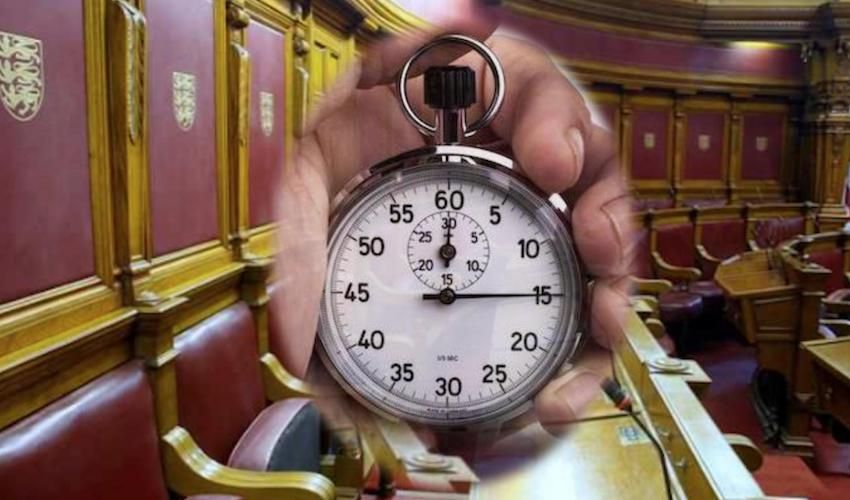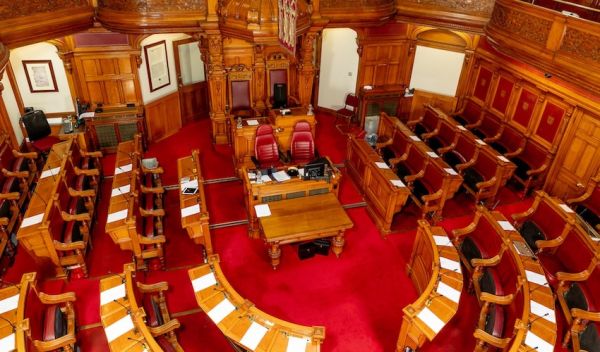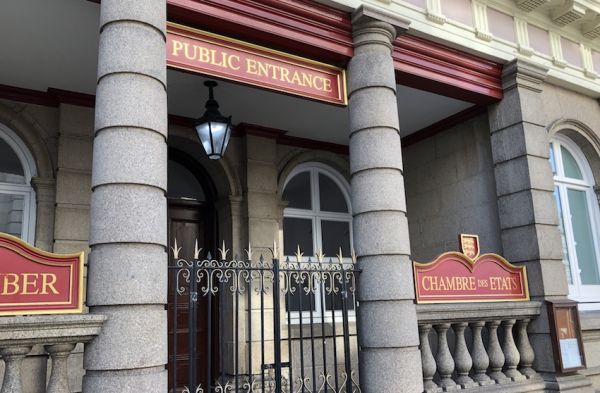


States Members have voted to limit their speaking time during debates to a maximum of 15 minutes.
The successful proposition was brought by the Privileges and Procedures Committee (PPC) – the panel responsible for the rules which govern the States Assembly – to create a general rule that speeches during debates should be kept to the 15-minute time limit.
The Committee’s proposals hope to “help the Assembly manage business more effectively.”

Pictured: Debate speeches will in general be limited to 15 minutes following this decision.
Now, the Assembly has approved PPC’s suggestions to keep speeches as succinct as possible. These are that:
During the debate, Chair of PPC Deputy Russell Labey clarified that not all speeches will be subject to the new time limit.
In the accompanying report to their proposition, PPC wrote: “There have been several States meetings over the last 18 months which have exceeded the three days set aside for Assembly business, which has led to inconvenient late sittings and sittings at short notice on Mondays or Fridays.
“Without time limits, the only way of curtailing sittings is to defer propositions to a later date, which isn’t always possible, or to use the closure procedure. The closure has been used more frequently in 2019 than before, but even when the closure is proposed, Members do not necessarily make shorter contributions, which means that Members who want to speak on a topic are denied the chance to do so.”
Chair of PPC @RussellLabey says not all speeches will be subject to the proposed 15 min time-limit, e.g. speeches to propose or sum-up a proposition, or if a politician has particular expertise which requires a longer speech. Find the proposition here: https://t.co/c2FeDcRutq
— States Assembly (@StatesAssembly) November 12, 2019
In making this “straightforward change to Standing Orders,” which are the procedures which stipulate how States sittings proceed, the Committee argues that 15 minutes is plenty of time for politicians to convey their meaning.
“Few Members speak for more than 15 minutes in debates, and the Committee’s view is that in most cases any Member can get across the points they want to make within that period of time. The Assembly has experienced presiding officers who are capable of enforcing time limits fairly and effectively, and exercising discretion sensibly and in accordance with the mood of the Assembly.”

Pictured: The debate was held in the States Assembly.
The proposition was passed 26 votes to 19.
Those voting for were: Deputies Lindsay Ash, Inna Gardiner, Gregory Guida, Rowland Huelin, David Johnson, Russell Labey, Kevin Lewis, Steve Luce, Jeremy Maçon, Kevin Pamplin, Jess Perchard, Susie Pinel, Hugh Raymond, Richard Renouf, Graham Truscott, Scott Wickenden; and Constables Richard Buchanan, Mike Jackson, John Le Bailly, John Le Maistre, Philip Le Sueur, Sadie Le Sueur-Rennard, Len Norman, Karen Shenton-Stone and Chris Taylor.
Those Members voting against were: Senators John Le Fondré, Lyndon Farnham, Ian Gorst, Sam Mézec, Steve Pallett, Tracey Vallois; Deputies Steve Ahier, Carina Alves, Carolyn Labey, Mary Le Hegarat, Judy Martin, Kirsten Morel, Trevor Pointon, Geoff Southern, Montfort Tadier, Rob Ward, John Young; and Constables Deidre Mezbourian and Simon Crowcroft.
Comments
Comments on this story express the views of the commentator only, not Bailiwick Publishing. We are unable to guarantee the accuracy of any of those comments.